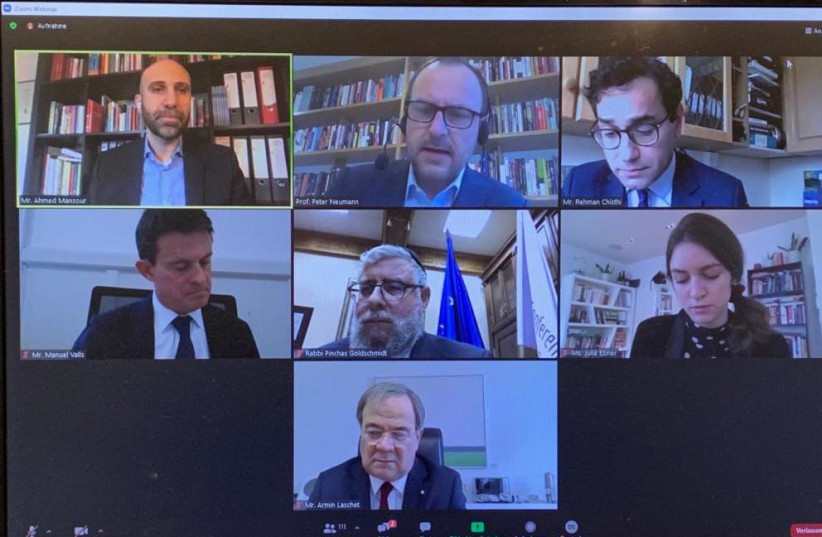
In the wake of recent Islamist attacks across Europe in Paris, Nice, Vienna and Dresden, the Conference of European Rabbis (CER) and the newly founded Institute for Freedom of Faith and Security in Europe (IFFSE) hosted its first panel bringing together high-level European leaders to discuss the matter last Friday.
As part of the project, the IFFSE launched a series that debates new ideas on combating religious extremism and terrorism in Europe, featuring some of Europe’s leading politicians, thinkers and policymakers, including former French prime minister Manuel Valls.
Moderated by the prestigious security expert Peter Neumann, from King’s College London, the panelists discussed some of the ways in which European nations can better work together to combat the unabating rise of terrorism across Europe, especially in light of the recent attacks in Vienna and several French cities.
During the session, Valls spoke out in favor of creating a “European Islam,” explaining that “the idea is to sever ties with the countries of origin,” adding that the undertaking is certainly not easy and will take decades, but that it is “unavoidable.”
Valls supported French President Emmanuel Macron’s plan to allow and certify the training of imams only in Europe. He called, for example, the financing of Islamic communities from Qatar “a danger.”
North Rhine-Westphalia’s Minister-President Armin Laschet also pointed out that, in the tradition of France, there is a strict separation between church and state, whereas in Germany the distinction is not so clear – meaning any laws regarding Islam would not necessarily be enforceable throughout Europe.
President of the CER, Chief Rabbi Pinchas Goldschmidt also renewed the demand that the training of religious leaders must in future take place in Europe and be certified according to a strict catalog of criteria, referring to a manifesto of the Conference of European Rabbis published in 2015.
cnxps.cmd.push(function () { cnxps({ playerId: ’36af7c51-0caf-4741-9824-2c941fc6c17b’ }).render(‘4c4d856e0e6f4e3d808bbc1715e132f6’); });
if(window.location.pathname.indexOf(“647856”) != -1) {console.log(“hedva connatix”);document.getElementsByClassName(“divConnatix”)[0].style.display =”none”;}
Goldschmidt added to that the critical need for religious leaders to show loyalty to the laws in force in individual countries, to profess peace and tolerance, and to communicate this to their communities.
British MP and former special envoy for freedom of religion and relief, Rehman Chishti, agreed with Goldschmidt and pleaded for more financial transparency of mosques.
He said that due to strict regulations, the UK has already had a good experience in this area and that more discussions in Europe about these practical experiences are needed.
On a related note, Valls also pointed out that Turkish President Recep Tayyip Erdogan wanted to exercise control over Islam, a remark Laschet concurred with, who added that before Erdogan, Turkey had also been a secular state and that Erdogan had brought Turkish domestic politics, such as the fight against the Gülen movement, into mosques.
Laschet called for more European cooperation to curb Islamist extremism, saying that “this is a struggle that we can only fight together as Europeans. It is not a national issue,” – a point that Austrian Minister for Integration and Women, Susanne Raab agreed with, saying that Europeans must tackle the challenge of terrorism and religious extremism together.
They are not attacks on individuals, but “on our democratic principles and values,” she added, pointing out that this is not a fight against Muslims or migrants, but against religious extremism such as political Islam that seeks to divide society.
“Those who only fight extremists when they become terrorists have lost,” warned the German expert on Islamism, Ahmed Mansour, explaining that jihadists are only the tip of the iceberg, and in order to “to fight extremism,” you have to find the spiritual instigators.
Mansour continued, saying that in recent years, Europe has learnt a lot in terms of security concepts, deradicalization, and prevention, but that there is still a lack of European and global cooperation between the authorities, stressing that “the flow of communication must be improved”.
Extremism expert Julia Ebner of the Institute for Strategic Dialogue (ISD) said that the attack in Vienna had shown that prison did not help integration.
“The identity crisis is the lowest common denominator of radicalized jihadists and also of right-wingers,” added Ebner, stressing that the influence of radicalization in online spaces is growing massively.”
Related posts:
Inside the Fight to Forcibly Out Transgender Students in California
South Korea Bans Balloon Launches Into North Korea, Affecting Gospel Work
‘We made history’: NASA launches lightest & first 3D-printed satellite, designed by Indian teen
World Jewish Congress welcomes EU’s decision to fight against antisemitism
Belarusian opposition leader says there is ‘no turning back’ in fight against Lukashenko
Poll: US Concern Over ‘Pervasive’ High-Level Corruption Surging Under Trump
 RSS Feed
RSS Feed















 November 26th, 2020
November 26th, 2020  Awake Goy
Awake Goy  Posted in
Posted in  Tags:
Tags: 













